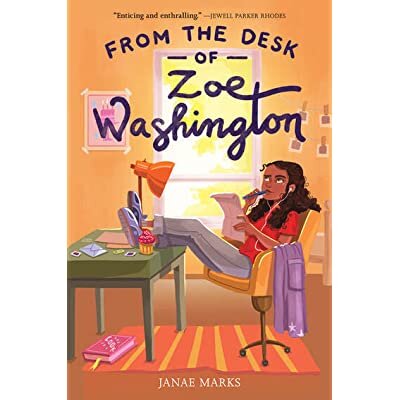Book Review: From the Desk of Zoe Washington
I just finished From the Desk of Zoe Washington by Janae Marks and this book has so much potential for classroom use! It is a delightful read and a wonderful middle grade novel to share with kids in many ways. The main character is having both friend and family drama which will be so relatable to many upper elementary students and middle schoolers. Also, she loves to bake and wants to be a pastry chef so the descriptions of cupcakes alone will pull some students in. I’ve always loved books that included letters between characters, and Zoe (the main character) exchanges letters with her biological father, Marcus, who is in prison. Many students (and adults) don’t hear any humanizing stories about people who are incarcerated or the toll our massive incarceration rates has on families and children.
Zoe’s father, Marcus, says he is innocent, and Zoe talks to her grandmother about how that could even be possible. She connects this new information with what she knows about Black Lives Matter and systemic racism. The connections are clear and not overly simplified, yet also at a kid-friendly level. She also learns about The Innocence Project and grapples with the mystifying fact that innocent people can go to prison. The author doesn’t shy away from the fact that this knowledge is heavy and many parts of what Zoe is learning are scary for her. Her parents and grandma try to shield her and forbid her from following up with what she has learned and the depiction of the frustration of being dismissed as just a kid is very accurate and would strike a chord with many students.
This book could be a wonderful whole class read aloud or book group book, as the chapters are a good length for both of these formats. Students could learn about wrongful conviction, the toll of incarceration on families (at least 5 million children have had a parent behind bars), advocacy and representation, systemic racism, justice system reform, and more. Zoe’s choice to defy her parents’ and grandma’s restrictions would also be a wonderful discussion point with students. At one point, Zoe thinks to herself, “All of the lying was wrong, I knew that. But maybe it was okay to do something wrong if you were doing it for the right reason.” (p.180). I’ve talked to students in the past about when it’s okay to break the rules and how you might still have to accept the consequences of your actions, but you choose to break the rules because of something more important. Zoe models this as she gets in trouble and apologizes for lying and breaking her family’s trust, but her actions end up setting some changes in motion.
While this book ultimately has a happy ending, it still talks about the reality that appealing a wrongful conviction takes years and is very difficult and complicated and that many people who get out of prison (whether they are innocent or not) have trouble finding jobs and struggle financially for a variety of reasons. There are educational resources available through the Equal Justice Initiative to help you give students more background and understanding of the scale and scope of the issues. The Marshall Project is also a great resource. It’s targeted towards adults, but will help you have the background you need to have these important conversations with students. If you haven’t read this book yet, run and get a copy! It belongs in the hands of readers!
